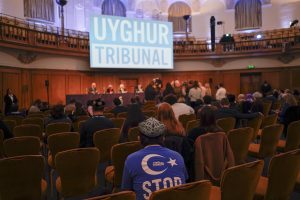On a cold and clear day in London, one year ago, the Uyghur Tribunal delivered an historic judgment. The December 9 verdict that China had committed genocide against the Uyghur people was momentous because independent experts recognized our suffering. The day was also a milestone since the world now had the evidence it needed to end that suffering.
Nearly a year later, the horrific apartment fire on November 24 in the Uyghur capital of Urumqi sparked global shock and outrage that broke through Chinese government denials of inhumane treatment of Uyghurs. With the exits blocked under 100-plus days of brutal COVID lockdowns in the region, Uyghurs died in unimaginable agony — the official death toll is 10, but activists believe several dozen may have perished.
The Tribunal already demonstrated a year ago that ongoing atrocity crimes in the region constituted genocide. Will the world now finally act in a serious way?
Uyghurs have designated December 9, the day of the Tribunal’s verdict, as “Uyghur Genocide Recognition Day.” We simply cannot let the Chinese government escape accountability for its crimes.
The rationale for the Uyghur Tribunal was premised on the insufficiency of multilateral institutions to hear evidence on allegations of gross human rights abuses committed against the Uyghurs and other Turkic peoples since 2016. The panel of international experts and lawyers reviewed over 500 witness statements and heard live evidence from more than 30 eyewitnesses and survivors of the Chinese government’s concentration camp system. The panel also heard testimony from 40 expert witnesses. The evidence database includes upwards of 100,000 pages of documents.
The testimonies described a systematic campaign to eradicate Uyghur culture, religion, and language through policy and practice. Moreover, horrific details emerged about widespread forced labor, disappearances, mass imprisonment, torture, sexual abuse, and coercive birth prevention measures. Pointing to evidence of forced sterilization of Uyghur women, the panel judged the atrocity crimes to be in contravention of the Genocide Convention.
Using the term “genocide” has proved difficult for many. One article in the Economist called it the “wrong word.” In response, Uyghur researcher Nyrola Elimä succinctly explained that “while the world debates a word, we are dying.”
Even before the Uyghur Tribunal’s adjudication that genocide is underway, other official bodies around the world had come to the same conclusion. It began with the January 2021 U.S. State Department announcement recognizing the genocide. The Biden administration publicly upheld the determination within weeks of taking office. Legislative bodies in Canada, Czechia, Lithuania, the Netherlands, and the U.K. have also designated China’s treatment of Uyghurs as genocide.
Yet other states have pulled their punches. In May 2021, in New Zealand, the governing Labor Party opposed a motion on a genocide determination and opted for “severe human rights abuses” instead. The Italian parliament condemned the Chinese government’s crimes, but only after amending the resolution to take out the word “genocide.”
Failure to confront genocidal actors has appalling consequences. Criminal regimes only become emboldened to undermine global security. Before Vladimir Putin’s war on Ukraine in 2022 was the limp response to Putin’s annexation of Crimea in 2014.
Civil society has not waited for governments to act. Religious groups comprising Muslims, Jews, and Christians have pressured governments. Civil society organizations from 41 countries have come together in the Coalition to End Forced Labor in the Uyghur Region, to end corporate “business as usual” in global supply chains. Jewish civil society organizations, leading the global imperative to remember the Holocaust, have been front and center.
The cost of doing business with Xi Jinping’s genocidal regime needs to be higher. Global security cannot be promoted through complacency and appeasement. All governments need to end corporate profits from these crimes, through import bans like the Uyghur Forced Labor Prevention Act. The EU, Australia and the U.K. need to act quickly on pending legislation.
We are well past “early warning” signs — governments must follow through with a coordinated diplomatic response, which includes accepting much larger numbers of Uyghurs at risk abroad. More countries must also impose Global Magnitsky sanctions. Only four countries have imposed targeted human rights sanctions on perpetrators of this genocide, with no follow-up since March 2021.
The U.N.’s top human rights official, Volker Türk, must make the issue one of his top priorities as he begins his term, and the U.N.’s top labor body, the International Labor Organization, must pursue a Commission of Inquiry to investigate widespread forced labor in the Uyghurs’ home region. Governments should also enact without delay import bans on products made with forced labor, similar to the Uyghur Forced Labor Prevention Act in the United States.
December 9 is Uyghur Genocide Recognition Day because it is a landmark in the contemporary history of the Uyghur people. We observe it not only because we must mourn the countless victims, but also because of the urgent need to end the atrocities. Uyghurs are observing this day, and International Human Rights Day on December 10 — the 74th anniversary of the 1948 Universal Declaration of Human Rights — by calling once again for global action.

































